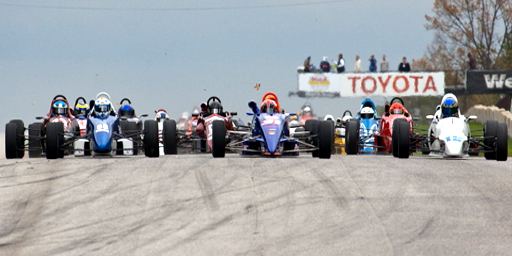Formula Ford - A Brief History
Formula Ford originated in the UK in 1967 when the first Cortina powered Lotus 51s were built to replace F3 cars being used at the MRS driving school at Brands Hatch. Their cost, complete and ready to run, was one thousand pounds sterling. Engines were provided by Ford at the princely sum of fifty pounds each! Transmissions were Renault units as used in the Lotus Europa and Colin Chapman, consequently, had access to a whole bunch of them!
The class was adopted by the SCCA in 1969 and FF1600 soon became the most significant single-seat racing class in the world. It was not uncommon to see grids of up to fifty fairly equal cars take the green flag. The thousands of FF chassis produced over the following four decades far outnumber those of any other racing class. The original Ford Cortina engine that powered these rear-engined, tube-chassis cars was replaced when Ford introduced the sturdier, venerable Uprated or Kent version in 1971. In the early years of its long history, the class was a major step in the ladder to the top and several future World Champions honed their skills and became recognized while racing in Formula Ford.
 |
| A typical packed grid for a Formula Ford race in the early 1970's when the class experienced explosive growth. |
The hallmarks of FF1600 were its low cost and the restrictive rules which assured that it was a class where the driver's skill made the difference. Even today, that characteristic remains a major aspect of the class's considerable appeal. Formula Ford continues to be a strong National class because it still provides what is arguably the greatest value in Club Racing. Cars are available at all price levels as are engines. Rules stability is also a major factor and the amateur racer who wants to can still build up, modify and tune his own engine.
Since 2002 when the SCCA approved an open approach to aftermarket engine parts production, FF1600 has had a rebirth and Regional fields have increased significantly. The Kent engine can now be made extremely reliable and its life between rebuilds has been extended significantly.
 |
| The start of the 2010 National Championship RunOffs at Road America. |
The Regional Club Ford class for pre-1982 cars has become highly popular throughout the country. With a huge support network of part sources, prep shops and engine builders, a devoted following of thousands of racers continues to assure Formula Ford's vitality. Although its former role has been, in some ways, eclipsed by spec and wing cars, it remains a racing class which, true to its history, continues to provide an exciting racing experience at relatively low cost.